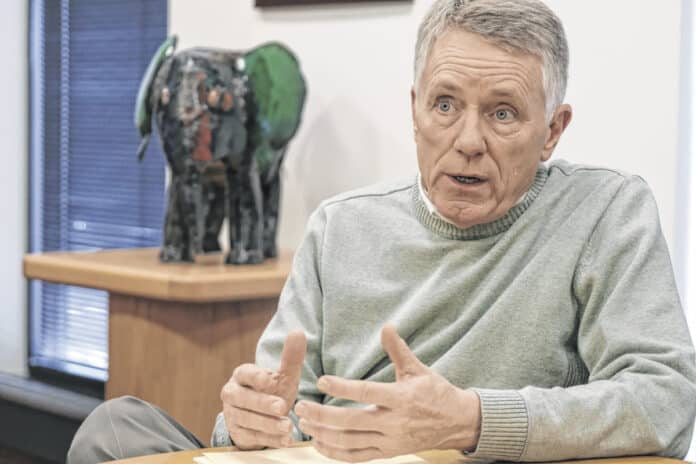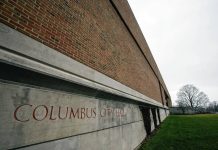
Columbus Mayor Jim Lienhoop and city officials hope to advance several projects this year and “re-engage” with the Envision Columbus downtown strategic development plan, while allowing that much of the year, if not all of it, will likely be “dominated by COVID-related issues.”
City officials are making plans under the assumption that the local area may start to see hints of life transitioning to a new post-pandemic normal as early as July, though Lienhoop said it largely depends on how the pandemic progresses and how quickly vaccines can be distributed to the community.
City operations have not been completely disrupted, but they have been impacted. Trash continues to be picked up, roads continued to be fixed, law enforcement and first responders continue to operate, although city buildings are currently closed to the public.
As of late last week, a little over 10 city officials were out quarantining due to having COVID-19, symptoms consistent with a coronavirus infection or being a close contact of someone who has COVID-19. That number at times has been as high as 25.
“We continue to be sort of dominated by COVID-related issues,” Lienhoop said. “…But we have begun to think about what happens post-COVID, and we don’t know for sure when we’re going to be in a post-COVID environment but we’re telling ourselves July 1. Hopefully, it’s sooner than that. … We realize it’s going to be a while. We don’t know how long it’s going to take, but we just told ourselves internally that July 1 will be a date that we’ll plan towards and then we’ll re-evaluate that as we get closer to it.”
City projects
There are several major projects underway in Columbus in various stages of development, including FairOaks Mall, a downtown hotel/conference center, urban grocer and riverfront development.
Because of the COVID-19 pandemic, the multifamily urban grocer project and the city’s plans for a hotel conference center were split off into two separate projects.
Sprague Hotel Developers also put the hotel conference center project on hold in July until the hospitality industry recovers from the impact of COVID-19 pandemic.
The proposed hotel/conference center is a major component of the city’s 2018 Envision Columbus downtown strategic development plan. It has been described as a road map for the future of the commercial area of downtown Columbus and its neighboring residential areas and parks.
The city is working with Bartholomew County in a land swap that will result in the hotel and conference center being placed on a county-owned block surrounded by Second, Franklin, Third and Lafayette streets downtown.
With the exception of the Bartholomew County Court Services building on the northwest corner, the entire block currently serves as a parking lot. Under the land swap agreement, the new court services center and its parking lot will be on the south side of First Street, across from the Bartholomew County Jail.
Additionally, the city is close to reaching an agreement for its mixed-use multifamily urban grocer development at the site of the former Bob’s Car Wash but that agreement has been slightly delayed due to some site concerns related to environmental concerns from when the site used to be a gas station.
“Sometime late spring, we will begin to re-engage with the Envision (Columbus) process, and the relevance of late spring is that I would hope by that time that we’ve begun construction on the court services building and we have a solidified agreement … with respect to the apartment complex and the urban grocer,” Lienhoop said. “And once we sort of get those buttoned up — under contract — then we’ll begin to think a little bit more about some of the other concepts that were present in the Envision Columbus plan. I would imagine that we will be looking a little bit more intently at housing. Housing throughout Columbus, but in particular in the downtown area, say from (Columbus) City Hall up towards Donner Park, and what we can do to improve the housing stock that exists there. But we’ll also be looking at other parts of the city as well, whether that’s East Columbus or maybe out on the fringes where we might be able to encourage some more development.”
Currently, there are townhomes in central Columbus and residential units mainly directed toward seniors under development on the west side of the city, including one development off of Goeller Boulevard in Tipton Lakes and another on State Road 46 across the street from Westside Community Church, Lienhoop said, adding that “those are the kinds of things that we would like to promote further in 2021.”
Overall, Lienhoop said the city will likely continue to forge ahead on existing projects this year before shifting to something else, though the pace of progress could be impacted by the pandemic.
“The (railroad) overpass continues to be a real point of pride for us, and what I’m reminded of is — because I think about some of the downtown projects we’ve got like, the riverfront and the hotel/conference center and the apartments that we want to build east of the jail — how exceptional the overpass project was in terms of how quickly it got done,” Lienhoop said. “We can’t think that everything’s going to happen that fast. I get a little frustrated at the pace of some of the other projects that we have in mind, and part of my frustration is that I saw how quickly the overpass came together.”
FairOaks Mall
The project to transform FairOaks Mall into a community wellness, recreation and sports center, and determine new potential uses for the Donner Center and connectivity with the surrounding areas has been on pause during the pandemic.
But it still remains a priority for the city, and officials have started working on the next steps, said Mary Ferdon, the city’s executive director of administration and community development.
The next major piece of the project involves hiring an architectural firm to design the facilities at the mall, but the timeline for that is not yet clear, Ferdon said.
The pandemic also has placed an increased importance on a community-wide focus on health and wellness, Ferdon said.
City officials are still hoping to have some kind of community wellness center at the mall, but are still looking at how to “integrate the features that we had talked about” during the planning process before the pandemic and if any changes should be made.
The city of Columbus, Columbus Regional Health, along with the help of the Heritage Fund — The Community Foundation of Bartholomew County, purchased the 35.36-acre mall property at 25th Street and Central Avenue two years ago for $5.9 million.
The mall is projected to operate at an estimated $453,421 loss this year, which would be an increase from the $332,839 shortfall estimated for this year before the pandemic hit, according to documents reviewed and approved last month by the FairOaks Community Development Corp.
Lienhoop was hesitant to project when the city might break ground on the project, which largely depends on how the pandemic and other factors progress, but said he “would hope that at least by December, we’ve got a clear picture of what we’re going to do.”
“FairOaks Mall is never far from the front of our consciousness,” Lienhoop said. “We’ve been disappointed that our planning there got delayed due to the virus and the effect that it has on the revenue stream that we had identified to pay for the improvements that we anticipate there at FairOaks, but we’ve continued to have conversations with the hospital. They continue to indicate their intent on moving forward, and we are too. Once we kind of get past the contract stage for some of these downtown projects, FairOaks will also receive a fair amount of our intention because we realize that it’s a great opportunity. It’s a great asset, but it’s not doing too much for us right now, and we realize we need to change that.”
COVID-19 relief
Lienhoop did not rule out offering additional help this year to local businesses struggling to stay afloat due to the pandemic, including the possibility of expanding a city-run loan program to additional businesses that may not have qualified during earlier rounds of the program.
The program, called Columbus INvigorate, allowed small businesses within the Columbus city limits the opportunity to apply for a loan ranging from $5,000 to $25,000. The loans had a six-month deferral of interest and principal payments on the three-year terms. Interest rate after the six-month deferral was 1%.
At least 43 local businesses received loans through the program. The city set aside $1 million for the effort. The first round of the program opened in April, while the second round opened in September.
However, no decisions have been made on a potential third round, and the amount of relief at the federal level, particularly after President-elect Joe Biden takes office, would likely impact what city officials decide to do, Lienhoop said.
“We plan on taking a look at that,” Lienhoop said. “I really don’t know where that will go. We’ve got a couple hundred thousand dollars left in the fund that have not been loaned and we are interested in trying to provide the help that is needed, but we’ll just have to make a little bit more in-depth assessment before we open this up a third time. …Our sense is that we want to get a little bit of an idea on how repayments are occurring from the first round before we launch into a third one, but we’re trying to pay very close attention to the health of our smaller businesses, and it is concerning to us. We’re also watching what’s happening at the federal level.”
Tax revenue
Lienhoop said he does not anticipate seeing a drop income tax revenue this year due to the pandemic, but the city will likely see some sort of a decline in 2022 due to the 18-month lag between when the state collects the tax and when it is distributed to cities.
Local governments across Indiana could see a collective drop of $218.4 million to $315.4 million in income tax collections, according to a study last year by researchers at the Center for Business and Economic Research at Ball State University’s Miller College of Business.
In April, state tax collections in Indiana were about $960 million, or 44%, less than expected, and Holcomb said the state could see a drop of more than $3 billion in tax revenue over the next 14 months, according to The Associated Press.
Columbus’ budget relies on, in large part, property, income, vehicle excise and gas taxes to fund the city’s services, departments, programs, projects and other initiatives.
Currently, it is not yet clear how much of a decline Columbus will see in 2022, Lienhoop said.
“We anticipate a drop in 2022, but we don’t yet know the extent of that decline,” he said. “That information comes to us from the state, from the Department of Local Government Finance, and they’ve indicated to us that our tax revenue will be fairly consistent for 2021, because of the 18-month lag. …And we anticipate property taxes will be fairly consistent. When the economy enters a recession, there is a decline in property values but we’re not far enough into (a recession) or deep enough yet that it has affected the property valuations in this community. So we think 2021 will be a year similar to 2020.”




